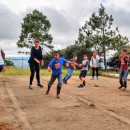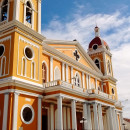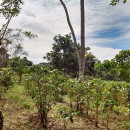My Heart is in Central America Past Review
By A student (Berea College) - abroad from 08/22/2016 to 12/10/2016 with
CGEE: Social Change in Central America: Exploring Peace, Justice, and Community Engagement
I learned the influence that the United States holds over Central America; I learned that humans are incredibly strong in spirit; I learned that in our core, we are all looking for the same things in life; I learned that the world is beautiful and astounding and simple mornings in fresh air surrounded by trees will take your breath away; I learned that if I want to find a home outside of the United States, it is in Central America. Vale la pena. It was entirely worthwhile.
Review Photos





Personal Information
| How much international exposure did you have prior to this program? | None |
Review Your Program
|
* Overall educational experience
Academic rigor, intensity, resources, etc. |
The best classes for me were the two final courses in Nicaragua regarding history and political science. I felt that I learned the most in those courses, but that may have been due to having new teachers in both the Liberation Theology course in Costa Rica and the Spanish course in Guatemala. The courses are intense -- Augsburg is expecting an entire semester's worth of learning and reflection within a one month period in each country. But the greatest thing was having such hands-on learning experiences incorporated into your classes as well. Nearly every day you're meeting inspiring and educational people who are telling you about their countries, their programs, their struggle and history and in each country you visit rural communities so you have a better picture of the land between its cities and its fields. It really brings the course materials into focus. |
|
* Host Country Program Administration
On-site administration of your program |
Our program facilitator was absolutely great and accompanied us to each country. We did not see much of our facilitator in Guatemala, but we spent extensive time with our Costa Rican and Nicaraguan facilitators. All were understanding and friendly, though I admit they have very little training in conflict mediation and resolution which proved to be a big problem in my particular group of students. However, if you need a shoulder to lean on, these are the people who are willing to go out of their way to make you feel comfortable and safe. In any hospital visit, they made your health and comfort their number one priority and they were focused on making sure your home stays were welcoming. |
|
* Housing:
How satisfied were you with your living arrangements? |
Each home stay is so unique in every country, and I would recommend that within each country you visit the home stays of other students in the program as well because (at least for my semester) everyone had very different arrangements. Some lived in different living styles (compound housing vs. bi-level houses), some in different living conditions (large, very poor family vs. small, wealthier families), etc. I am more of an introverted person and was nervous before every stay, but the families are all experienced with hosting students and making you feel welcome. If you ever feel uncomfortable, however, mentioning it to the program facilitator allows them to move you to a more accommodating house. The bonds you get to form with the families are great, and I feel entirely comfortable returning to the countries and seeking the families I stayed with once more. |
| * Food: |
Everything organic all the time, you hardly have to cover your own food costs (only if you want treats or want to go out), and everything is so filling. I'm writing this review after ending the program a month ago and I'm currently going through withdraw from the fresh and amazing food every day! All the host families understand how to clean and disinfect food properly, so as long as you refrain from eating street food or lettuce in certain places, you will never get a bacterial infection. |
|
* Social & Cultural Integration:
How integrated did you feel with the local culture? |
Costa Rica is the only country where I didn't feel entirely integrated with the local culture, but that may have been because there was so much more homework to do for the course in that country. In Guatemala, it's impossible not to interact with the local community since you'll encounter it in the walk to and from school every day and in the field trips with your professors. However, in Nicaragua you may have to seek local festivities and activities for yourself to get a taste of the culture. I found myself in an active host family who enjoyed going to the park and participating in local festivals when they arrived. Overall it was great and I felt you could really see the personality of each country reflected in its people. |
|
* Health Care:
How well were health issues addressed during the program? |
Healthcare was great! The program's insurance covered everything, the program administration really took charge to make sure you were well-cared for in a timely manner and if it was taking longer, they made sure you were fed and comfortable. Be sure to get all of your vaccinations before the program and definitely bring bug spray because Zika was extremely prevalent in Guatemala. You will also need bug spray when you visit the rural areas. Don't worry about running out of bug spray though, because once you get to Nicaragua there is a plethora available in the CGEE house! Administration also takes care to procure mosquito nets when necessary. |
| * Safety: |
Although we were advised that we were inhabiting dangerous areas, I never felt unsafe while abroad with this program. However, I am aware that I also understand the measures you must take to protect yourself. Never flash money around, keep your bags close and if it has a strap, make sure it is across your chest. Understand where you're going and who you are with. One annoyance to me was that as part of the program, there are times where you may be prevented to venture out on your own and so you will have to convince another student in the program to accompany you wherever you wish to go. Be aware that if you are white and/or American, you will instantly be identified as wealthy and may lead to more vendors and beggars reaching out to you. |
| If you could do it all over again would you choose the same program? |
Yes
I would choose the same program but I would hope for a bigger group of people. Any unpleasantness during the program was more due to issues in the small group of students I was in than the program itself. |
Finances
|
* Money: How easily were you able to live on a student's budget?
(1 = not very easy/$200+ on food & personal expenses/week, 2.5 = $100/week, 5 = very easily/minimal cost) |
I allotted myself $200 per country initially, and I found it extremely easy to live in Nicaragua on that budget (in four weeks, I had hardly spent $100). However, in Guatemala I went over-budget because I traveled to Tikal and Panajachel, so if you would like to visit more locations outside of the program or do touristy activities, it is going to cost more. Costa Rica was the most expensive country in the program, even according to my host family there. Do not forget about allotting money for fall/spring break as well! The program does not cover any costs for this period. |
| Do you have any general money-saving tips for future study abroad participants? | Try to buy things in local markets, from local vendors, using local currency. While you will find a lot of places willing to accept American currency, it hurts the local economy to do so. In addition, local vendors usually sell a lot cheaper than big stores like Walmart (and its Latinx affiliates in the region). |
Language
| * Did your program have a foreign language component? | Yes |
|
How much did the program encourage you to use the language?
0 = No encouragement, 5 = frequent encouragement to use the language |
While in Costa Rica and Nicaragua you will not speak much Spanish in the courses, you will speak with your host families and the speakers as well. I feel much more comfortable with my Spanish after the program. |
| How would you rate your language skills at the beginning of the program? | Intermediate |
| How would you rate your language skills at the end of the program? | Advanced |
| How many hours per day did you use the language? | |
| Do you have any tips/advice on the best ways to practice the language for future study abroad participants? | Go out of your way to practice and communicate with your family and even with other students in the program. Bring a Spanish-English dictionary! I found that the more I pushed myself to tell stories in Spanish, the better I was able to understand and speak for myself in the future. It may have been slow and embarrassing at times, it was a great learning experience! |
Other Program Information
|
* Where did you live?
Select all that apply |
|
|
* Who did you live with?
Select all that apply |
|
|
* Who did you take classes with?
Select all that apply |
|
| About how many local friends did you make that you will likely keep in touch with? |
A Look Back
| * What did you like most about the program? |
|
| * What could be improved? |
|
| * What do you know now that you wish you knew before going on this program? | I went into the program without having a list of goals or expectations for myself during the program, and I wish I had made that list beforehand to guide my self-reflections during my time abroad. I deeply regret not having had something to guide my thoughts and learning because I believe my experiences would have had much greater impact on my personal development. |
Reasons For Studying Abroad
| To help future students find programs attended by like-minded individuals, please choose the profile that most closely represents you. |
The Academic or LinguistYou went abroad with specific academic goals in mind; the program credentials and rigor of your coursework abroad were very important to you. You had a great time abroad, but never lost sight of your studies and (if applicable) were diligent with your foreign language study. Good for you! |
Individual Course Reviews
| Course Name/Rating: |
SPN 311: Intermediate Conversation and Composition |
| Course Department: | |
| Instructor: | Victor Garcia/Gabriela Rodas |
| Instruction Language: | Spanish |
| Comments: | This course was a bit difficult for a few reasons. One, Augsburg College expects a lot of work to be done in your short time. Four essays, four presentations (that were to be different from the essays), and two drafts each for the four essays -- all in Spanish. Class is first thing in the morning and lasts five hours. I found myself having to switch professors because my learning style did not fit the teaching style of my first instructor, but there is so much room to practice your Spanish in this course. Many days I found myself simply talking about Guatemala with my instructor, learning and asking questions about subjects I don't know if I would've been able to ask our guest speakers. Both professors really enjoyed field trips and so we were able to visit local government buildings and parks, in addition to small local businesses. There were exams in addition to the essays and presentations. While at the time it seemed overwhelming, in comparison to the later courses it was not as vigorous. |
| Credit Transfer Issues: |
| Course Name/Rating: |
REL 366: Latin American Liberation Theologies |
| Course Department: | |
| Instructor: | Dr. David Castillo |
| Instruction Language: | English |
| Comments: | I believe what made this course the most challenging was having a professor who was as new to the course as the rest of us. I had never had a theology course before and he did not begin at an introductory level, leaving behind even those who had previous theology and philosophy experience. There was an astounding amount of reading assigned for the course, that left little time for me to interact with my Costa Rican host family because I was constantly trying to stay on top of the material. Questions weren't always readily answered and I feel that I learned more about liberation theology from speakers and my own research than from any material discussed in class. Hopefully it gets better in the future, but I was disappointed. |
| Credit Transfer Issues: |
| Course Name/Rating: |
POL 310: Citizen Participation within a Globalized Economy -- A Nicaraguan Case Study |
| Course Department: | |
| Instructor: | Elisa Vanegas |
| Instruction Language: | English |
| Comments: | A great course! I learned so much in this course, from speakers and Elisa's presentations as well. It may help to have some background in economics before the course so you better understand the conversations regarding the IMF, World Bank, and Structural Adjustment Policies (SAPs), but Elisa provides enough introductory material that you will be caught up in no time. She is passionate about economic justice and it really shows in her course. She is focused on making sure you understand the role you play as a global citizen and changes you should make when you return home to participate at greater levels. She gave one paper and a take-home exam. I recommend reading her recommended readings (readings outside required texts) because they were really interesting and gave greater context to some of the speakers we met with. |
| Credit Transfer Issues: |
| Course Name/Rating: |
HIS/WGS 355: Cultural Conflict and Social Change in Latin America: The Central American Context |
| Course Department: | |
| Instructor: | Kathy McBride |
| Instruction Language: | English |
| Comments: | Amazing course taught by an amazing woman. Kathy does not use presentations to teach but focuses instead on discussion, reflection, the meetings with speakers, the assigned readings, and the homework. While some reading is extensive, I found nearly all the material to be interesting and before the course is over you will have an incredibly thorough understanding of Nicaraguan history and U.S. foreign policies regarding Nicaragua since the early 1900's. The speakers we met for her class were life-changing leaders and inspirations within themselves. If I could take the course all over again, I would because it had such an impact. Her final project is a combined project with the Political Science course and it allows for an ultimate reflection of all that you've learning while in the program. |
| Credit Transfer Issues: |








